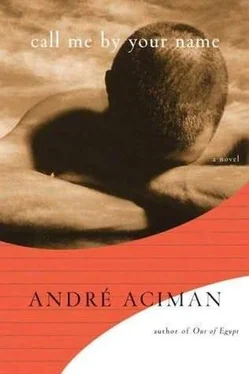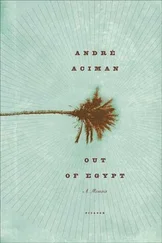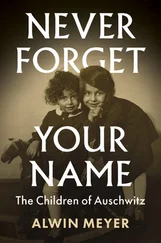André Aciman - Call Me by Your Name
Здесь есть возможность читать онлайн «André Aciman - Call Me by Your Name» весь текст электронной книги совершенно бесплатно (целиком полную версию без сокращений). В некоторых случаях можно слушать аудио, скачать через торрент в формате fb2 и присутствует краткое содержание. Год выпуска: 2007, Издательство: Farrar, Straus and Giroux, Жанр: Современная проза, на английском языке. Описание произведения, (предисловие) а так же отзывы посетителей доступны на портале библиотеки ЛибКат.
- Название:Call Me by Your Name
- Автор:
- Издательство:Farrar, Straus and Giroux
- Жанр:
- Год:2007
- ISBN:нет данных
- Рейтинг книги:5 / 5. Голосов: 6
-
Избранное:Добавить в избранное
- Отзывы:
-
Ваша оценка:
- 100
- 1
- 2
- 3
- 4
- 5
Call Me by Your Name: краткое содержание, описание и аннотация
Предлагаем к чтению аннотацию, описание, краткое содержание или предисловие (зависит от того, что написал сам автор книги «Call Me by Your Name»). Если вы не нашли необходимую информацию о книге — напишите в комментариях, мы постараемся отыскать её.
is clear-eyed, bare-knuckled, and ultimately unforgettable.
Call Me by Your Name — читать онлайн бесплатно полную книгу (весь текст) целиком
Ниже представлен текст книги, разбитый по страницам. Система сохранения места последней прочитанной страницы, позволяет с удобством читать онлайн бесплатно книгу «Call Me by Your Name», без необходимости каждый раз заново искать на чём Вы остановились. Поставьте закладку, и сможете в любой момент перейти на страницу, на которой закончили чтение.
Интервал:
Закладка:
He was teasing. I offered the same smile as before. He understood, said nothing, we laughed.
He asked what I did. I played tennis. Swam. Went out at night. Jogged. Transcribed music. Read.
He said he jogged too. Early in the morning. Where did one jog around here? Along the promenade, mostly. I could show him if he wanted.
It hit me in the face just when I was starting to like him again: “Later, maybe.”
I had put reading last on my list, thinking that, with the willful, brazen attitude he’d displayed so far, reading would figure last on his. A few hours later, when I remembered that he had just finished writing a book on Heraclitus and that “reading” was probably not an insignificant part of his life, I realized that I needed to perform some clever backpedaling and let him know that my real interests lay right alongside his. What unsettled me, though, was not the fancy footwork needed to redeem myself. It was the unwelcome misgivings with which it finally dawned on me, both then and during our casual conversation by the train tracks, that I had all along, without seeming to, without even admitting it, already been trying — and failing — to win him over.
When I did offer — because all visitors loved the idea — to take him to San Giacomo and walk up to the very top of the belfry we nicknamed To-die-for, I should have known better than to just stand there without a comeback. I thought I’d bring him around simply by taking him up there and letting him take in the view of the town, the sea, eternity. But no. Later!
But it might have started way later than I think without my noticing anything at all. You see someone, but you don’t really see him, he’s in the wings. Or you notice him, but nothing clicks, nothing “catches,” and before you’re even aware of a presence, or of something troubling you, the six weeks that were offered you have almost passed and he’s either already gone or just about to leave, and you’re basically scrambling to come to terms with something, which, unbeknownst to you, has been brewing for weeks under your very nose and bears all the symptoms of what you’re forced to call I want . How couldn’t I have known, you ask? I know desire when I see it — and yet, this time, it slipped by completely. I was going for the devious smile that would suddenly light up his face each time he’d read my mind, when all I really wanted was skin, just skin.
At dinner on his third evening, I sensed that he was staring at me as I was explaining Haydn’s Seven Last Words of Christ , which I’d been transcribing. I was seventeen that year and, being the youngest at the table and the least likely to be listened to, I had developed the habit of smuggling as much information into the fewest possible words. I spoke fast, which gave people the impression that I was always flustered and muffling my words. After I had finished explaining my transcription, I became aware of the keenest glance coming from my left. It thrilled and flattered me; he was obviously interested — he liked me. It hadn’t been as difficult as all that, then. But when, after taking my time, I finally turned to face him and take in his glance, I met a cold and icy glare — something at once hostile and vitrified that bordered on cruelty.
It undid me completely. What had I done to deserve this? I wanted him to be kind to me again, to laugh with me as he had done just a few days earlier on the abandoned train tracks, or when I’d explained to him that same afternoon that B. was the only town in Italy where the corriera , the regional bus line, carrying Christ, whisked by without ever stopping. He had immediately laughed and recognized the veiled allusion to Carlo Levi’s book. I liked how our minds seemed to travel in parallel, how we instantly inferred what words the other was toying with but at the last moment held back.
He was going to be a difficult neighbor. Better stay away from him, I thought. To think that I had almost fallen for the skin of his hands, his chest, his feet that had never touched a rough surface in their existence — and his eyes, which, when their other, kinder gaze fell on you, came like the miracle of the Resurrection. You could never stare long enough but needed to keep staring to find out why you couldn’t.
I must have shot him a similarly wicked glance.
For two days our conversations came to a sudden halt.
On the long balcony that both our bedrooms shared, total avoidance: just a makeshift hello, good morning, nice weather, shallow chitchat.
Then, without explanation, things resumed.
Did I want to go jogging this morning? No, not really. Well, let’s swim, then.
Today, the pain, the stoking, the thrill of someone new, the promise of so much bliss hovering a fingertip away, the fumbling around people I might misread and don’t want to lose and must second-guess at every turn, the desperate cunning I bring to everyone I want and crave to be wanted by, the screens I put up as though between me and the world there were not just one but layers of rice-paper sliding doors, the urge to scramble and unscramble what was never really coded in the first place — all these started the summer Oliver came into our house. They are embossed on every song that was a hit that summer, in every novel I read during and after his stay, on anything from the smell of rosemary on hot days to the frantic rattle of the cicadas in the afternoon — smells and sounds I’d grown up with and known every year of my life until then but that had suddenly turned on me and acquired an inflection forever colored by the events of that summer.
Or perhaps it started after his first week, when I was thrilled to see he still remembered who I was, that he didn’t ignore me, and that, therefore, I could allow myself the luxury of passing him on my way to the garden and not having to pretend I was unaware of him. We jogged early on the first morning — all the way up to B. and back. Early the next morning we swam. Then, the day after, we jogged again. I liked racing by the milk delivery van when it was far from done with its rounds, or by the grocer and the baker as they were just getting ready for business, liked to run along the shore and the promenade when there wasn’t a soul about yet and our house seemed a distant mirage. I liked it when our feet were aligned, left with left, and struck the ground at the same time, leaving footprints on the shore that I wished to return to and, in secret, place my foot where his had left its mark.
This alternation of running and swimming was simply his “routine” in graduate school. Did he run on the Sabbath? I joked. He always exercised, even when he was sick; he’d exercise in bed if he had to. Even when he’d slept with someone new the night before, he said, he’d still head out for a jog early in the morning. The only time he didn’t exercise was when they operated on him. When I asked him what for, the answer I had promised never to incite in him came at me like the thwack of a jack-in-the-box wearing a baleful smirk. “Later.”
Perhaps he was out of breath and didn’t want to talk too much or just wanted to concentrate on his swimming or his running. Or perhaps it was his way of spurring me to do the same — totally harmless.
But there was something at once chilling and off-putting in the sudden distance that crept between us in the most unexpected moments. It was almost as though he were doing it on purpose; feeding me slack, and more slack, and then yanking away any semblance of fellowship.
The steely gaze always returned. One day, while I was practicing my guitar at what had become “my table” in the back garden by the pool and he was lying nearby on the grass, I recognized the gaze right away. He had been staring at me while I was focusing on the fingerboard, and when I suddenly raised my face to see if he liked what I was playing, there it was: cutting, cruel, like a glistening blade instantly retracted the moment its victim caught sight of it. He gave me a bland smile, as though to say, No point hiding it now .
Читать дальшеИнтервал:
Закладка:
Похожие книги на «Call Me by Your Name»
Представляем Вашему вниманию похожие книги на «Call Me by Your Name» списком для выбора. Мы отобрали схожую по названию и смыслу литературу в надежде предоставить читателям больше вариантов отыскать новые, интересные, ещё непрочитанные произведения.
Обсуждение, отзывы о книге «Call Me by Your Name» и просто собственные мнения читателей. Оставьте ваши комментарии, напишите, что Вы думаете о произведении, его смысле или главных героях. Укажите что конкретно понравилось, а что нет, и почему Вы так считаете.









